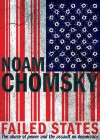Failed States: The abuse of power and the assault on democracy
Written by: Noam Chomsky,
Allen & Unwin, Sydney, 2006,
ISBN: 9780805082845, 328pp.
Reviewed by: Hugh Smith, Visiting Fellow, School of Humanities and Social Sciences, University of New South Wales at the Australian Defence Force Academy
The main title of Chomsky’s latest book is somewhat misleading. It is not an examination of the misery experienced by the many Third World states riven by civil strife, criminality, corruption and chaos—states that have not so much failed as never succeeded. It is rather another of Chomsky’s sustained polemics against United States foreign policy towards the rest of the world.
The list of charges against the United States will be familiar—as Chomsky would claim, they have been valid for so long. There is America’s failure to take nuclear disarmament seriously as the Non-Proliferation Treaty requires. There is US readiness to use force unilaterally, evidenced by numerous military interventions and the doctrine of preventive war. There is America’s disregard for international law, as witnessed, for example, by rejection of the International Criminal Court, willingness to countenance torture, and disregard for the Geneva Conventions—not to mention ill-disguised contempt for the United Nations except when it suits US interests. Underlying US policy, Chomsky argues, is an exceptionalism that assumes that, unlike every other state, what is good for America is good for the world.
Chomsky also turns his attention to America’s internal politics where the sources of this kind of thinking are to be found. He denounces the failure to protect US citizens from violence, the acceptance of gross inequality in access to medical care and education, the high rates of imprisonment and use of the death penalty, the readiness to ignore the rule of law, and the democratic deficit—that discrepancy between rhetoric about democracy and the ugly reality which can be ascribed in part to the power of business and special interest lobbies. The book thus argues—not altogether convincingly—that US public opinion favours internationalist measures such as the International Criminal Court and Kyoto, while opposing the idea of preventive war. A faulty democratic system, however, means majority views can be ignored. This condition Chomsky sees as reason to deem the US itself a failed state.
Chomsky’s style of argument is relentless and bruising. Nothing politicians say can be believed—Reagan, Bush 41, Clinton and Bush 43, for example, are therefore no more credible than Stalin or Mao Ze Dong. No profession of concern for human rights by the US Administration can ever be taken at face value. The claim to promote democracy abroad is a mere sham—the United States thus supports dictators such as Saddam Hussein in the 1980s or President Suharto in Indonesia and works against popular governments, overtly or covertly, in countries such as Chile and Nicaragua. America’s blind obsession with Cuba and its uncritical support for Israel permanently undermine prospects of peace. And so the argument goes on.
The central problem with Chomsky, however, is that his position lacks all semblance of complexity. There is no place for mixed motives, for genuine misjudgements, for real fears about the Soviet Union in its heyday, for anxiety (soundly-based or not) about terrorism. If there is a choice between conspiracy and cock-up as explanations, always choose the former. Nor is there any tolerance for the nasty compromises that political leaders often have to settle for both at home and abroad. In Chomsky’s world, there exists a sustained and systemic evil in US domestic politics and foreign policy that seems beyond redemption.
Much that Chomsky has to say is valid and many of his arguments are telling. Yet his unwillingness to address the real dilemmas of politics—the inevitability of compromise and the need to balance promotion of national interests against regard for international rules —will win few supporters other than those already committed to his worldview. This is a pity. US domestic and foreign policies deserve to be criticised (as do those of probably every country). Thus, the war in Iraq is, at best, a reckless venture, and the Bush Administration’s lack of concern for the rule of law at home and abroad is even more worrying for its friends than for its enemies. The case, however, needs to be made with more subtlety and understanding than is evident in Failed States.

